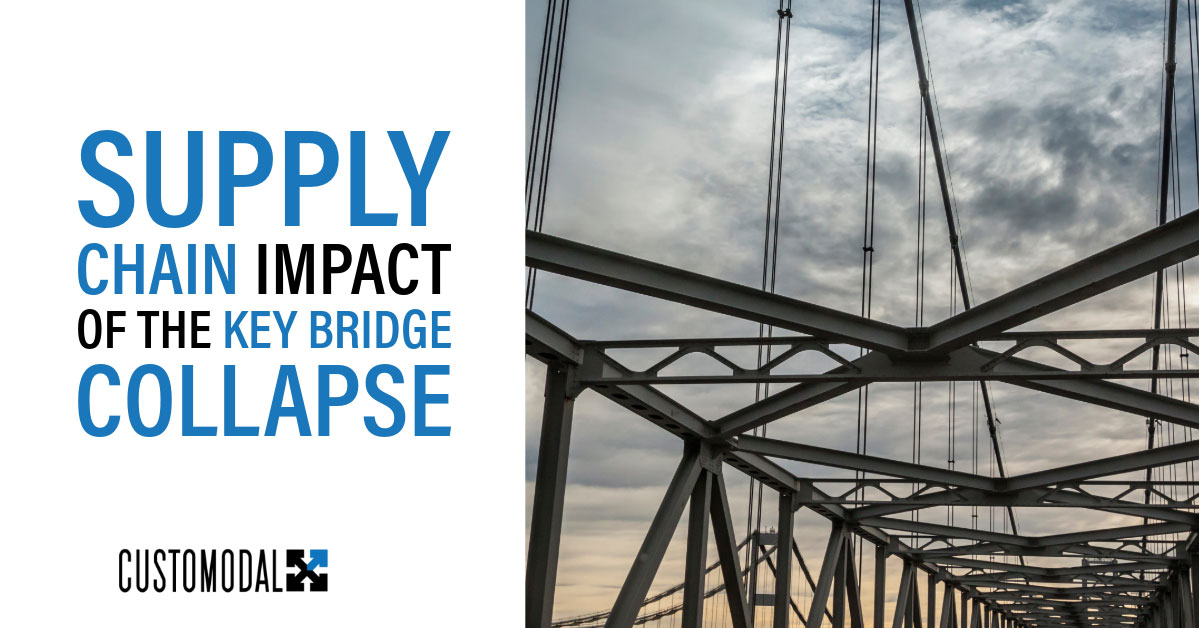The Impact of the Francis Scott Key Bridge Collapse on Baltimore’s Supply Chain
The recent collapse of the Francis Scott Key Bridge in Baltimore, Maryland, has sent shockwaves through the transportation and logistics industry. As a critical artery for the movement of goods and people, the collapse has not only resulted in tragic loss of life but also significant disruptions to supply chains, particularly for a city like Baltimore, which boasts the title of the #1 port for importing vehicles into the US. At Customodal, we recognize the magnitude of this event and its far-reaching implications for businesses and communities.
In this blog post, we delve into the key aspects of the bridge collapse and its implications for the supply chain landscape.
Bridge Overview: The Francis Scott Key Bridge, an iconic structure that has stood as a vital link in the Baltimore Beltway since its opening in March 1977, spanned 1.6 miles across the Patapsco River. With a daily traffic volume exceeding 30,000 commuters, the bridge served as a lifeline for the region’s transportation network. Its collapse following a collision with the container vessel Dali has left a void in the infrastructure landscape, impacting not only daily commuters but also the flow of goods through one of the nation’s busiest ports.
Impact on Supply Chain: Baltimore’s significance as the ninth biggest US port for international cargo cannot be overstated. With record-breaking cargo volumes in recent years, valued at billions of dollars, the port serves as a crucial gateway for global trade. The collapse of the Francis Scott Key Bridge has disrupted this flow, causing immediate challenges for businesses reliant on timely imports and exports.
Customodal CEO Mike Eberl points out that Baltimore’s prominence as a hub for importing vehicles into the US adds another layer of complexity to the situation. The diversion of traffic to other East Coast or Southern ports will undoubtedly strain existing infrastructure and resources, leading to short-term disruptions across multiple regions.
Short-Term Disruptions and Uncertainty: In the wake of the bridge collapse, uncertainty looms large over the supply chain landscape. Businesses that rely on the smooth functioning of the Baltimore port are facing logistical challenges and delays in receiving essential goods. The ripple effects extend beyond Baltimore, impacting downstream industries and supply chain partners across the country.
The immediate focus is on restoring the flow of goods and restoring normalcy to the affected regions. However, the road to recovery is fraught with challenges. While President Joe Biden has pledged support for rebuilding the bridge, the process will take time, exacerbating the disruptions in the interim.
Medium-Term Outlook: As Baltimore works towards rebuilding the Francis Scott Key Bridge, other ports along the East Coast and in the Southern region may witness a surge in activity as businesses seek alternative routes for their shipments. This influx presents both opportunities and challenges for these ports, as they scramble to accommodate increased volumes while maintaining operational efficiency.
In the medium term, some of the diverted traffic may become permanent fixtures at these ports, leading to potential shifts in supply chain dynamics. This underscores the need for flexibility and adaptability within the industry to navigate evolving challenges and seize emerging opportunities.
Bottom Line: The collapse of the Francis Scott Key Bridge in Baltimore has sent shockwaves through the supply chain industry, causing disruptions and uncertainty on a scale not seen in recent years. As businesses and communities grapple with the aftermath of this tragic event, it’s imperative to collaborate, innovate, and adapt to ensure the resilience of our supply chains. At Customodal, we remain committed to supporting our clients through these challenging times and working towards a brighter, more resilient future for the logistics industry.
Customodal is here to help with your logistics needs. Reach out to our team today:


